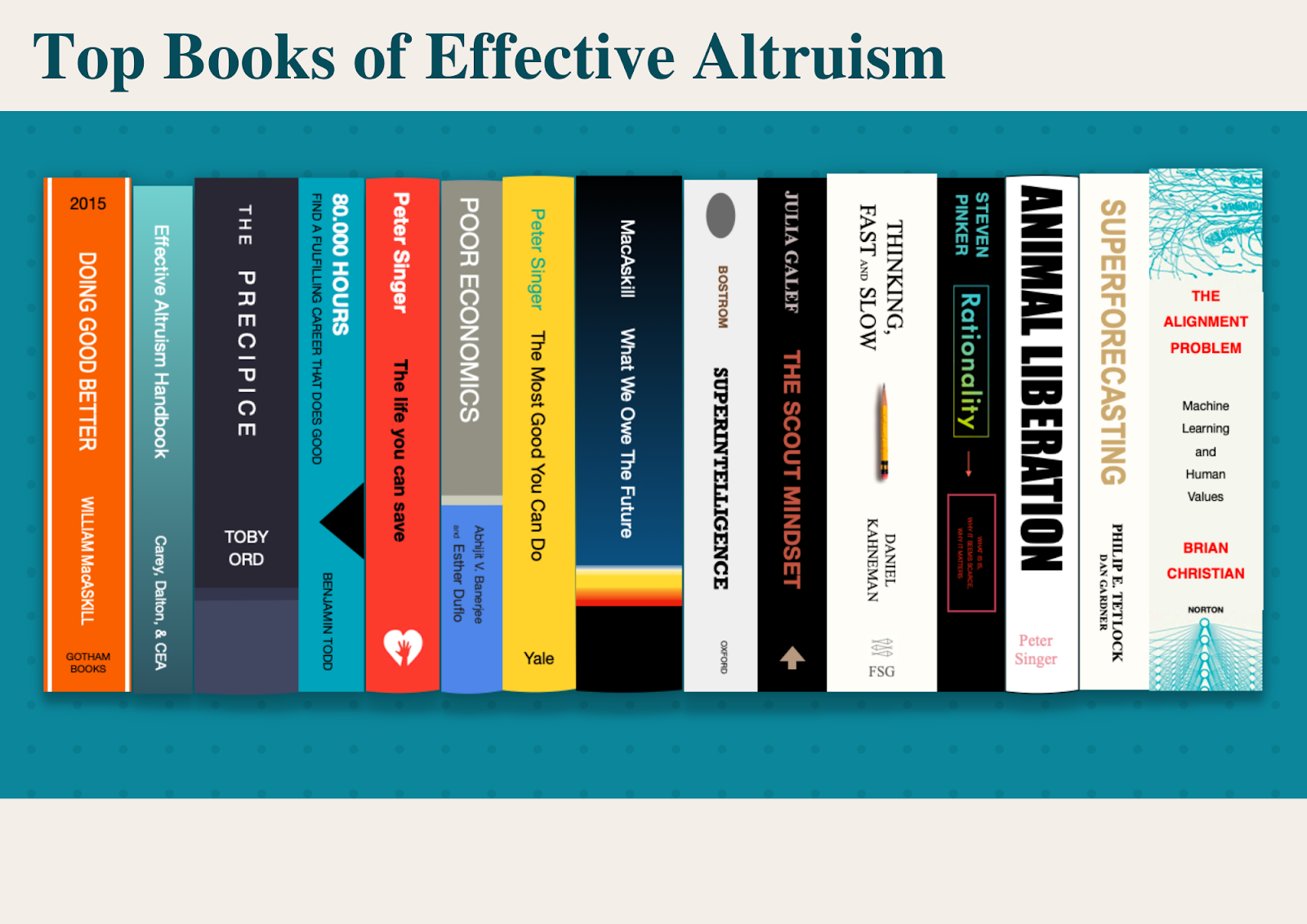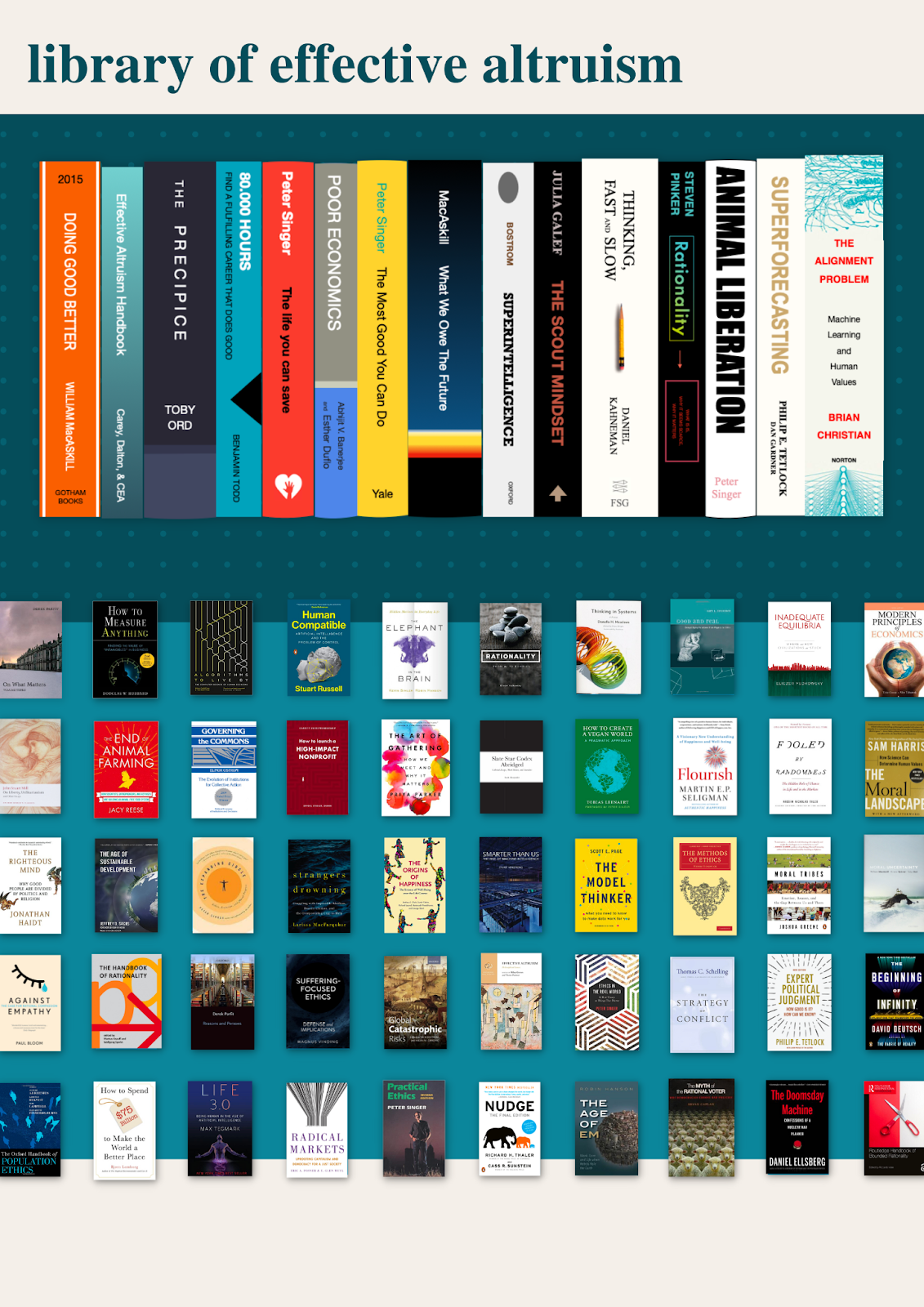Earlier I announced the project to co-create an effective altruism reading list information design poster. Now follows the announcement of the (preliminary) final book list and poster design.
Recapitulation of the first post
- After identifying and summarizing existing book surveys and lists in the EA sphere top-down, a significant part of the process was (and is) the idea of bottom-up co-creation, being open to comments, and the option to take a survey.
- The goal of the project is to provide a visual representation of the knowledge space within effective altruism represented by its books and to offer a surface for discussion and disagreement about the included books.
- The finished poster can then serve as a guide for self-study and function as a quality control measure to ensure that foundational ideas are understood.
- The final design will be a digital document or a physical poster that can be transformed into a scratch-off poster.
- A one-month salary from the Center for Effective Altruism funded the project.
- The value of information mapping was demonstrated by showcasing other visual maps of knowledge spaces.
- A first list of books sources, a list of books, and the first draft of the poster were introduced.
- Readers could write comments and take a survey to add their perspectives.
What has happened since
- Since the first post was published, the comments and survey results were analyzed.
- A final list was conducted.
- Further design options were considered, and a final design decision was made.
- (Two) final designs were created
The Final List
Top Books:
- Doing Good Better (William MacAskill)
- The Precipice (Toby Ord)
- The Life You Can Save (Peter Singer)
- EA Handbook (version 1, version 2, version 3)
- 80.000 Hours (Ben Todd)
- What We Owe The Future (William MacAskill)
- Poor Economics (Abhijit Banerjee & Esther Duflo)
- The Scout Mindset (Julia Galef)
- Thinking, Fast & Slow (Daniel Kahneman)
- Superforecasting (Philip Tetlock, Dan Gardner)
- Rationality (Steven Pinker)
- Superintelligence (Nick Bostrom)
- Animal Liberation (Peter Singer)
- The Alignment Problem (Brian Christian)
- The Most Good You Can Do (Peter Singer)
Longer List:
- Reasons and Persons (Derek Parfit)
- On What Matters Volume 3 (Derek Parfit)
- Practical Ethics (Peter Singer)
- On Liberty & Utilitarianism (John Stuart Mill)
- Moral Tribes: Emotion, Reason, and the Gap Between Us and Them (Joshua Greene)
- Suffering-Focused Ethics: Defense and Implications (Magnus Vinding)
- The Moral Landscape (Sam Harris)
- Against Empathy (Paul Bloom)
- The Expanding Circle: Ethics, Evolution, and Moral Progress (Peter Singer)
- Ethics in the Real World (Peter Singer)
- Moral Uncertainty (Krister Bykvist, William MacAskill, Toby Ord)
- Strangers Drowning (Larissa MacFarquhar)
- The Methods of Ethics (Henry Sidgwick)
- Oxford Handbook of Population Ethics (Gustaf Arrhenius, Krister Bykvist, Tim Campbell, Elizabeth Finneron-Burns)
- Effective Altruism. Philosophical Issues (Hilary Greaves, Theron Pummer)
- Good & Real (Gary Drescher)
- Algorithms to Live By (Tom Griffiths & Brian Christian)
- Model Thinker (Scott Page)
- The Elephant in the Brain: Hidden Motives in Everyday Life (Robin Hanson & Kevin Simler)
- Beginning of Infinity (David Deutsch)
- Rationality: From AI to Zombies (Eliezer Yudkowsky)
- Fooled by Randomness (Nassim Taleb)
- Slate Star Codex (Abridged) (Scott Alexander)
- Handbook of Bounded Rationality (Riccardo Viale)
- Smarter Than Us (Stuart Armstrong)
- Human Compatible (Stuart Russell)
- Life 3.0 (Max Tegmark)
- Age of Em (Robin Hanson)
- The End of Animal Farming (Jacy Reese)
- How to create a vegan world: A pragmatic approach (Tobias Leenaert)
- Flourish (Martin Seligman)
- The Origins of Happiness (Clark, Flèche, Layard, Powdthavee, Ward)
- The Age of Sustainable Development (Jeffrey Sachs)
- How to spend 75 Billion to Make the World a Better Place (Bjorn Lomborg)
- Nudge (Richard Thaler & Cass Sunstein)
- The strategy of Conflict (Thomas Schelling)
- The Art of Gathering (Priya Parker)
- How to Measure Anything (Douglas W. Hubbard)
- Inadequate Equilibria (Eliezer Yudkowsky)
- Governing the Commons (Elinor Ostrom)
- Thinking in Systems (Donella Meadows)
- The Righteous Mind (Jonathan Haidt)
- Modern Principles of Economics (Alex Tabarrok & Tyler Cowen)
- Radical Markets (Glen Weyl & Eric Posner)
- Expert Political Judgement (Philip E. Tetlock)
- Global Catastrophic Risks (Milan M. Ćirković & Nick Bostrom)
- The Doomsday Machine (Daniel Ellsberg)
- The Myth of the rational voter (Bryan Caplan)
- Handbook of Rationality (Markus Knauff & Wolfgang Spohn)
- How to Launch a High-Impact Non-Profit (Antonia Shann, Joey Savoie, Patrick Stadler)
While the list is the final list of this particular project, one of its main functions has always been to create a surface for debate. If you disagree and have additional information, yes, please do comment; it's a process.
I have added many additional books you suggested to me. However, one of the central insights from the comments and the survey was to reduce dramatically (“cull!”) the number of books. Similar to GiveWell’s idea of a small list of top charities, books have to be in a similar ballpark of information value to be included. The first draft included many books that, while good books and somewhat relevant, upon further inspection, did not play in a similar league to one another. All of these have been removed, and the list has been shortened.
The second-order effect of the same idea was to introduce two tiers of books. A shorter list for “top books” that play an undeniably essential role, and a longer one for quite important books that many agree to be valuable, without being of the same importance as the top books.
Another insight was that the original list included many books I wanted to include. With the intention of putting myself completely into the service of a good representation of the community consensus for this project, I overcame my motivated reasoning here to my best capability. I hope to write a post about what books I think more of you should read, but that's a different project.
Some comments on two books that are included in the "top books" list:
- The EA Handbook (version 1, version 2, version 3): While the older version has been available as a booklet, the newest version doesn't officially fulfill the criterion of, well, being a book. As the handbook is a central document of the EA community and is long enough to be easily transposed into an actual book, I find the choice justified. Not mentioning it among the most important book-like sources would feel like a misrepresentation. I also liked the option to give out the older EA Handbook physically in outreach attempts; it would be great if the newest version, again, would also be available as a book(let). If you agree with this, acknowledge this here, there has also been this debate about it here. I intentionally meant to point to all three handbooks, as it implicitly also transports some knowledge about how the community has developed.
- 80.000 Hours: While the book by Ben Todd captures some core tenets of the 80.000 Hours memeplex, it is not up to date and does not capture many other important parts of their research, like problem profiles. Having an updated atlas of all the written content by 80.000 Hours would be great in light of this project while understanding that it is not a high priority to create.
The Final Design
The updated design now represents the updated list of books in two tiers. The first and simpler poster represents the top books only. The second represents both tiers, the top books by their spines on a shelf and the others by their cover.
Top Books Only
Library of effective altruism (Top Books+)
The design was also adapted to resemble the EA corporate identity - in colors, type, and design - more closely, as inferred from the effectivealtruism.org website.
The choice that books in the second tier are cut off at the borders is meant to suggest that this is a non-exhaustive selection; the actual list continues beyond what is depicted here.
The initial plan, upon feedback on design options, was to create a full design that depicts book spines to resemble a bookshelf. Sadly, photos of book spines were difficult to acquire digitally. Recreating book spine covers as vector graphics (from crowd-sourced photos) was an additional project that turned out to be out of the scope of the time investment committed to.
Learnings and Conclusions
The current poster should still get overhauled by a graphic designer. Then a layer for print and scratch-off functionality can get added.
I knew before that the unit of knowledge in the community is not the book. While starting with a book poster makes sense, as the problem is more tractable, a similar project about essays, book chapters, concepts, organizations, people, and timelines of (past) events, would be even more interesting.
Beyond the problem of books not being the real “unit of knowledge” of effective altruism, one list of books winning along “one dimension of value” will make an implicit statement about the relative importance of different causes by the number of books that represent them. Books have value along multiple dimensions and are of different relevance to different people, causes, and goals. There is no way to capture it all with one list like this.
I look forward to more of you getting inspired to make information maps, posters, and big-picture visualizations for more specialized causes, topics, or fields of action, like, e.g., the map of biosecurity interventions.


